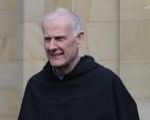Who do we follow, and why?

‘Then the chief priests decided to kill Lazarus as well, since it was on his account that may of the Jews were leaving them and believing in Jesus.'
John 12:11
The readings in the lead up to the Easter Triduum, beginning with the Mass of the Lord's Supper on Holy Thursday, set the scene for the events to come. The mention of Lazarus today points to the Resurrection, though in Lazarus' case it wasn't strictly speaking a resurrection but a resuscitation anticipating it - bearing in mind that the Gospels were written after the Resurrection and in the light of the post-Easter experience. The interesting, and intriguing, thing is that those opposed to Jesus not only wanted to kill him but Lazarus as well. Lazarus' being brought back from the dead must have been regarded by them as an affront to their faith. Another example of Jesus offending the religious sensibilities of the day.
Again, we are reminded in today's Gospel that the opposition to Jesus is on religious grounds: he dared to do things in God's name when he wasn't supposed to, and people followed him. This angered the religious establishment, the ‘chief priests'. They had the monopoly on religion. They would decide what to believe and how to believe it. Who did Jesus think he was? Perhaps there is a lesson for us today. What are our own religious beliefs based on? Who do we follow, and why?
Britain is supposed to be a ‘secular' society. But a closer look reveals many different and competing faiths, even within Christianity and the Catholic Church. And all these different beliefs are defended vehemently. The secular atheist can be just as dogmatic as the religious enthusiast. The so-called ‘liberal' agnostic, when pushed, can be very insistent about the dangers of religious faith in spite of claiming ‘not to know' if there is a God or not. And so on. The recent film, The Two Popes, explored the serious fault-line running through the Catholic Church between two very different attitudes towards it, with each position often vigorously defended.
Holy Week, however, is a time to set differences aside and return to the basics of our faith. Why did Jesus die? What did his death achieve? How can I live my life in the light of Jesus' suffering, death and resurrection? We all live by a story. How does the story of Jesus inform the way I tell my own story? Indeed, what is my own story, and what part does Jesus play in it, if at all? Perhaps these are some of the questions we can reflect on this week.
A meditation written by Fr Paul Graham O.S.A., Assistant General on the Augustinian Council for Northern Europe, including the Provinces of Ireland, England & Scotland, Poland, Germany, Austria and Slovakia

Follow the Order of Saint Augustine (O.S.A.), Province of England and Scotland